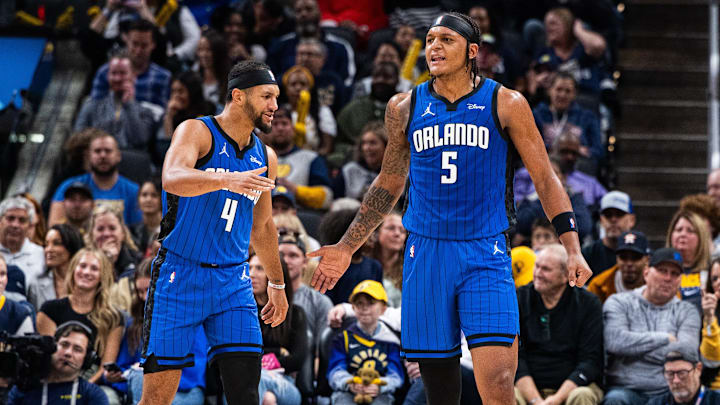Myth No. 5: Paolo Banchero is inefficient
One of the big debates during the draft process for Paolo Banchero centered on his efficiency. He was a player who played a lot in the low post at Duke and was not a great shooter. When the Magic were considering who to take, this was one of the central questions.
In the end, Banchero was the player among the three that looked and played most like a star. The kind of player you can give the ball to and let him work and get a good shot, even if it would be a bad shot for most other players.
Banchero proved that decision correct in his first two seasons—averaging 20.0 points per game and 22.6 points per game. He was an All-Star in his second season, gaining the respect of opposing coaches to get that nod. And he stepped up his game in the playoffs, averaging 27.0 points per game against the Cleveland Cavaliers last year.
Yet, the debate remains as Sam Vecenie acknowledged in ranking Paolo Banchero No. 5 in Game Theory's 24 best players younger than 24 years old.
Even late in Banchero's rookie year when it was clear he was the Rookie of the Year (he netted 98 of the 100 first-place votes), arguments kept coming up that Banchero was, in fact, not the Rookie of the Year.
The argument for Jalen Williams of the Oklahoma City Thunder was about efficiency without much consideration for the role and responsibility he played. The same goes for the lingering talk about Chet Holmgren being the best player in Paolo Banchero's draft class.
That is also what fed the conversation about Scottie Barnes being better than Paolo Banchero in some circles. There is an argument to be made about Banchero's efficiency.
There is no denying it. Banchero has had to work to improve as a shooter. His shooting splits have improved, going from 42.7/29.8/73.8 as a rookie to 45.5/33.9/72.5 as a second-year player—and 45.6/40.0/75.5 in the playoffs. The playoffs showed the kind of promise Banchero has.
And Banchero has to continue reducing his turnovers.
But Banchero really is not comparable to these peers. Banchero averaged 17.6 field goal attempts per game with a star-level 29.7 percent usage rate. Williams averaged 14.0 field goal attempts per game with a 23.7 percent usage rate and Barnes averaged 15.7 field goal attempts per game with a 24.8 percent usage rate.
Quite simply, the Magic have given Banchero far more responsibility than his peers. And he got more efficient last year as he grew into that role even more.
That is to say, yes Banchero needs to continue becoming more efficient. But his efficiency is not the detraction everyone thinks it is. He absorbs the inefficient shots to make everything else on the Magic go.
And Banchero is only going to get better as he finds his efficiency. He clearly can already lift his team to a playoff team and nearly guided them out of the first round despite his supposed inefficiencies.
At the end, winning should count, especially from a primary player.
